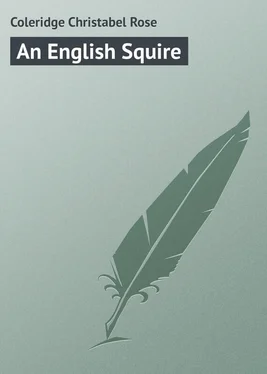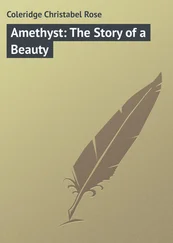Christabel Coleridge - An English Squire
Здесь есть возможность читать онлайн «Christabel Coleridge - An English Squire» — ознакомительный отрывок электронной книги совершенно бесплатно, а после прочтения отрывка купить полную версию. В некоторых случаях можно слушать аудио, скачать через торрент в формате fb2 и присутствует краткое содержание. Жанр: foreign_prose, на английском языке. Описание произведения, (предисловие) а так же отзывы посетителей доступны на портале библиотеки ЛибКат.
- Название:An English Squire
- Автор:
- Жанр:
- Год:неизвестен
- ISBN:нет данных
- Рейтинг книги:5 / 5. Голосов: 1
-
Избранное:Добавить в избранное
- Отзывы:
-
Ваша оценка:
- 100
- 1
- 2
- 3
- 4
- 5
An English Squire: краткое содержание, описание и аннотация
Предлагаем к чтению аннотацию, описание, краткое содержание или предисловие (зависит от того, что написал сам автор книги «An English Squire»). Если вы не нашли необходимую информацию о книге — напишите в комментариях, мы постараемся отыскать её.
An English Squire — читать онлайн ознакомительный отрывок
Ниже представлен текст книги, разбитый по страницам. Система сохранения места последней прочитанной страницы, позволяет с удобством читать онлайн бесплатно книгу «An English Squire», без необходимости каждый раз заново искать на чём Вы остановились. Поставьте закладку, и сможете в любой момент перейти на страницу, на которой закончили чтение.
Интервал:
Закладка:
“So you built castles in the air about your relations?” she said, with an odd longing to knock some of these castles down.
“Sometimes,” said Virginia; “then Ruth told me about you; and two years ago she and I met Cheriton Lester and his cousin Rupert in London, and I used to talk to them, Cheriton made me wish to come home very much.”
“Why?” said Miss Seyton shortly.
“He used to tell her about the place, and he made me remember much better what it was like.”
“Cheriton will have to play second fiddle. The eldest brother is coming back from Spain.”
“Ah, I remember, he told us how much he wished it. Oh, and he told me Uncle James ‘wasn’t half a bad fellow.’ I suppose that was a boy’s way of saying he was very nice indeed. Perhaps I can help him, too, in the village. I like school-teaching, and I suppose there aren’t many young ladies in Elderthwaite?”
“You little innocent!” exclaimed Miss Seyton. Then, moving away, she said, in the same wicked undertone, “Well, you had better ask him.”
Virginia remained standing by the fire. She felt ruffled, for she knew herself to be laughed at, and not having the clue to her aunt’s meaning, she fancied that her free and easy mention of Cheriton had elicited the remark; and being a young lady of decided opinions and somewhat warm temper, made up her mind silently, but with energy, that she would never like her Aunt Julia, never! She had been taken away from home when only eleven years old, and since then had only occasionally seen her father and her brothers. Her cousin Ruth, who had frequently stayed at Elderthwaite, had never bestowed on her much definite information; and perhaps the season in London and the renewal of her childish acquaintance with Cheriton Lester had done more than anything else to revive old impressions.
She had been most carefully brought up by her aunt, Lady Hampton, with every advantage of education and influence. Companions and books were all carefully chosen, and her aunt hoped to see her married before there was any chance of her returning to Elderthwaite. But such was the dread of the reckless, defiant, Seyton nature, that her very precautions defeated their wishes.
Virginia never was allowed to be intimate with any young man but Cheriton, who at the time of their meeting was a mere boy, and with thoughts turned in another direction; and though Virginia was sufficiently susceptible, with a nature at once impetuous and dependent, she came home at one-and-twenty, never yet having seen her ideal in flesh and blood.
“Duties enough, and little cares,” had filled her girlhood, and delightful girl friendships and girl reverences had occupied her heart; while her time had been filled by her studies, the cheerful gaieties of a lively neighbourhood, and by the innumerable claims of a church and parish completely organised and vigorously worked.
Lady Hampton was one of the Ladies Bountiful of Littleton; and Virginia had taught in the schools, made tea at the treats, worked at church decorations, and made herself useful and important in all the ways usual to a clever, warm-hearted girl under such influences. And with the same passionate fervour of nature, and the same necessity to her life of an approving conscience, which had made her mother’s heart beat itself to death against the bars of her unsatisfying home, Virginia’s nature had flowed on in perfect tune with her surroundings; till, when she was nearly twenty, came the great grief of her kind aunt’s death, leaving her heiress to a moderate fortune. By the terms of the will she was to travel under carefully selected guardianship till she was of age, and then to choose whether she would go home to her father, or have a home made for her at Littleton.
Virginia chose promptly, and then, in the delicate, indefinite language of those who fear to do harm by every word, was warned of difficulties. Much would be painful to her, much would be strange; her home was not like anything she had been used to. She listened and looked sad, and understood nothing of what they meant to imply; and thus ready to admire, but with only one type in her mind of what was admirable; full of love, but with none of the blinding softening memories that make love easy, she came to a home where admiration was impossible, and love would demand either ignorant indifference to any high ideal, or a rare and perfect charity, alike unknown to a high-minded intolerant girl.
Chapter Six.
Virginia
“A sense of mystery her spirit daunted.”
The vicar of Elderthwaite was Mr Seyton’s youngest brother. There had been one between them, the father of the Ruth mentioned in the last chapter, but he had married well, and died early, leaving this one girl, who lived with her grandmother, and paid occasional visits to Elderthwaite.
James Seyton had been the wildest of the three, and had taken orders to pay his debts by means of the family living, the revenues of which he had never fully enjoyed. He had never married, and his life – though just kept in bounds by the times in which he lived, so that he did not get tipsy in the Seyton Arms, nor openly scandalise a parish with so low a standard of right as Elderthwaite – was a thoroughly self-indulgent one. He read the service once on Sundays, and administered the Communion three times a year, while the delay and neglect of funerals, marriages, and baptisms were the scandal of every parish round. He rarely visited his flock; and yet the vicar was not wholly an unpopular man. He was good-natured, and though he drank freely and sometimes swore loudly, he had a certain amount of secular intercourse with his parishioners of a not unneighbourly kind.
The pressure of poverty made Mr Seyton a hard landlord, and between oppression and neglect the inhabitants of the picturesque tumbledown village were a bad lot, and neither squire nor parson did much to make them better. But their vicar now and then did put before the worst offenders the consequences of an evil life in language plain enough to reach their understanding; and he had a word and a laugh for most of them.
Mr Lester was frequently heard to inveigh against Parson Seyton’s shortcomings, and seriously, as well he might, regretted the state of Elderthwaite parish; but Mr Seyton doctored all his horses and dogs when they were ill, and was, “after all, an old neighbour and a gentleman.” He taught Cherry to catch rats, and took him out otter-hunting, and there was the oddest friendship between them, which Cherry, when a boy, had once exemplified in the following manner: —
The Bishop had paid an unexpected visit at. Oakby, and Cheriton following in the wake, while his father and Mr Ellesmere were showing off their new schools, heard him express his intention of going on to Elderthwaite; upon which Cherry ran full speed across the fields, found Parson Seyton shooting rabbits, decidedly in shooting-costume, gave him timely warning, and, with his own hands so tidied, dusted, and furbished up the wretched old church, that its vicar, entering into the spirit of the thing, fell to with a will, astonished the lazy blind old sexton, and produced such a result as might pass muster in a necessarily lenient north-country diocese.
Cherry then diffidently produced one of his father’s white ties which he had put in his pocket, “thinking you mightn’t have one clean,” and as the old vicar, with a shout of laughter, arrayed himself in it, he said, —
“Ay, ay, my lad, between this and the glass of port I’ll give his lordship (he won’t better that in any parish), we’ll push through.”
And so they did.
Parson Seyton was a man, if an erring one; but the mischief with his young nephews was that they seemed to have no force or energy even for being naughty, and as they grew up their scrapes were all those of idle self-indulgence, save when the hereditary passion for gambling broke out in Dick, the elder of the two, as had been the case lately, causing his removal from the tutor with whom he had been placed. Like their father, they had not strong health, and they had little taste for field sports, and none for books; they lay in bed half the day, lounged about the stables, and quarrelled with each other. But then their father had nothing to do, read little but the paper, and drank a great deal more wine than was good for him.
Читать дальшеИнтервал:
Закладка:
Похожие книги на «An English Squire»
Представляем Вашему вниманию похожие книги на «An English Squire» списком для выбора. Мы отобрали схожую по названию и смыслу литературу в надежде предоставить читателям больше вариантов отыскать новые, интересные, ещё непрочитанные произведения.
Обсуждение, отзывы о книге «An English Squire» и просто собственные мнения читателей. Оставьте ваши комментарии, напишите, что Вы думаете о произведении, его смысле или главных героях. Укажите что конкретно понравилось, а что нет, и почему Вы так считаете.












